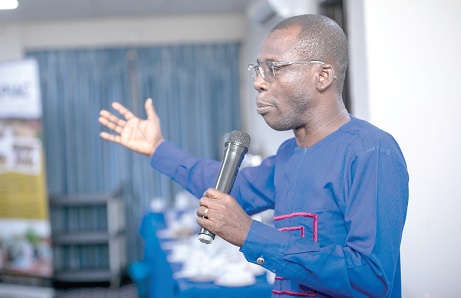The Public Interest and Accountability Committee (PIAC) has called for a national stakeholder consultation on recent amendments to the Petroleum Revenue Management Act (PRMA), 2011 (Act 815), to ensure a more inclusive approach in managing the country’s oil wealth.
It explained that the changes, if not reviewed, could have lasting consequences on transparency, local governance, and the equitable distribution of Ghana’s petroleum revenues.
The Coordinator of PIAC, Isaac Dwamena, made the call in a presentation on the 2025 PRMA Amendments and their Implications at a virtual media engagement on the 2025 Semi-annual Report held in Accra last Wednesday.
While acknowledging the government’s intention to strengthen infrastructure delivery, he stressed that the amendment process should have involved broader consultation with Parliament, civil society, and local authorities.
He said the 2025 amendment to the Act, which now mandates that the Annual Budget Funding Amount (ABFA) be used exclusively for infrastructure development instead of the previous list of “priority areas”, required that all petroleum revenue allocated through the ABFA go solely into infrastructure projects.
“This, according to the Ministry of Finance, is intended to ensure that oil funds are channelled into tangible, long-term assets that can drive economic growth,” Mr Dwamena said.
Consensus
The PIAC Chairman, however, stressed that while infrastructure investment was crucial, the narrow focus could limit the country’s ability to address pressing social and economic challenges, such as education, health, and agriculture, which had previously benefited from ABFA allocations.
“The petroleum revenues belong to all Ghanaians. Therefore, decisions on their use must reflect a broad national consensus and not be limited to one area of spending.
“We need a participatory approach that ensures every citizen feels the impact of our oil wealth,” he stated.
Amendment
Another major amendment, Mr Dwamena mentioned, was the repeal of Section 57(3), which previously guaranteed direct funding from the ABFA to PIAC.
The development, he said, could undermine the committee’s independence and operational effectiveness, as its funding would now depend on the discretion of the Ministry of Finance (MoF).
He revealed that before the 2025 amendment, PIAC received about 31 per cent of its approved annual budget from the ministry. However, that increased to about 85.5 per cent after its funding was statutorily tied to the ABFA.
“Without secure and predictable funding, our ability to conduct nationwide monitoring and public education will be severely constrained.
"Transparency in petroleum revenue use must not be sacrificed,” Mr Dwamena stated.
“We are not opposing the amendment in principle. What PIAC seeks is a more inclusive approach that balances infrastructure spending with social investments, ensures compliance with constitutional provisions, and maintains the integrity of oversight institutions,” he said.
He further urged Parliament to review the amendment to correct inconsistencies and establish clear implementation guidelines that prevent the misuse of petroleum funds.
“Our oil revenues are finite, so we must ensure that the legal framework governing their use remains transparent, inclusive, and aligned with Ghana’s long-term development goals,” he added.
